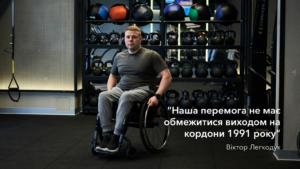…It’s the beginning of the 2000s. A small village in the Dnipropetrovsk region. A 13-year-old boy eagerly watched the new episode of his favorite sports TV show “Heroic Games”, the boy went outside and ran. After a decent distance, he pulled himself up several times on the horizontal bar on his parents’ backyard. Then he did push-ups from the ground.
In the end, he went to a homemade barbell made of pipe and wooden stumps and did a few bench presses. After the rain, the logs got wet and became heavier, but the young man was happy: more mass means more excitement.
The boy was sweating profusely, and he was pleased with himself – he was preparing to enter the military college.
In a few years, he will become a young paratrooper officer, he will plan to go on a peacekeeping mission to Africa, where he will serve eight months as a peacekeeper.
Then enemy Russian troops will invade his native country. He will receive a serious injury, but after that his spirit and body did not weaken.
This is a story of Viktor Legkodukh. In 2014, he was an officer of the 25th separate airborne brigade of the Armed Forces of Ukraine. During the battles with the Russians in August 2014, he was seriously wounded – since then, due to damage to the spinal cord, he moves around in a wheelchair. And in the gym, he also works out on a wheelchair.
Victor is a Warrior Games and Invictus Games medalist. He won gold, silver, and bronze. Now he is a candidate for master of sports, plans to become a master of sports of international class. And also – he is writing a dissertation on a topic related to Russian aggression.
This lieutenant colonel of the Armed Forces shows by his own example that the symbiosis of strength and intelligence in an officer’s body is about the image of the Armed Forces, state security and national stability.
The following is the story of a stubborn man, professional officer Viktor Legkodukh, for whom his passion for sports during the teenage years grew into something more important. Sport led him to the army, sport helped him during rehabilitation, sport gets him through life.
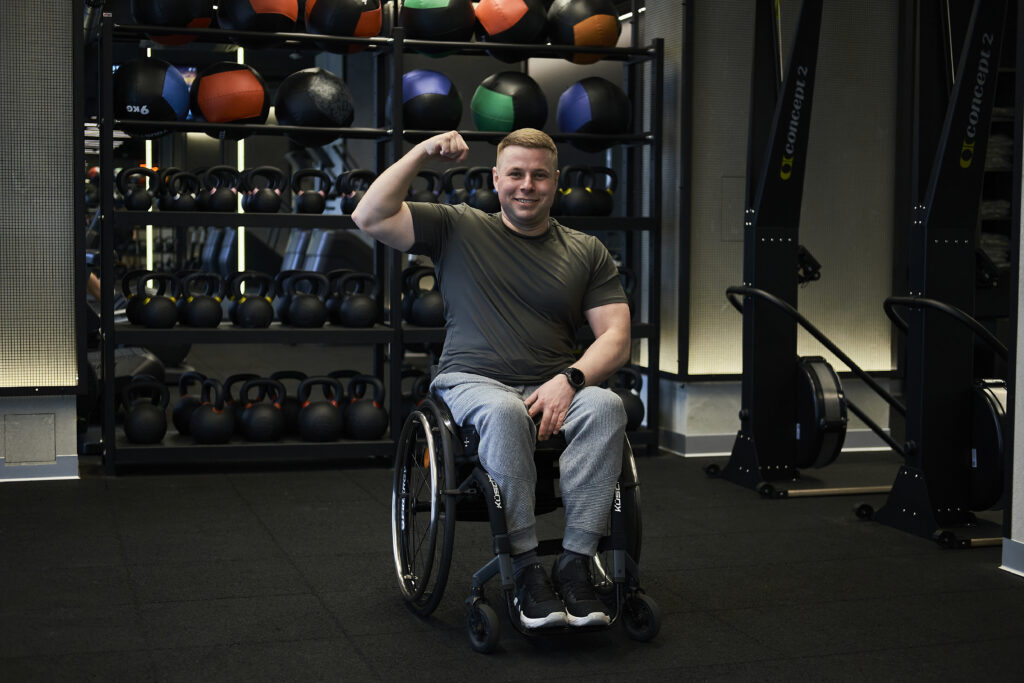
Military Academy: they did not us prepare for war, everyone wanted be on a peacekeeping mission
Viktor entered the military college in 2009.
I chose the faculty of aeromobile troops and intelligence and consciously planned it since the 9th grade – I ran a lot, worked out.
“At the entrance exams, I had a 3 km run, did pull-ups and a 100-meter run. I passed everything. Although I don’t see the point of running 100 meters, 20 kilometers is easy, but 100-meter run is not interesting” he says, laughing.
He says that he got hooked on sports since he was 13 years old.
“I really liked watching “Heroic Games”, bodybuilding competitions TV show. There were no sections or sports halls in the village. I come from a very small village, but I wanted to be athletic and look fit. It all started with running. Then – push-ups. Later, at home, he made a horizontal bar and bars, a primitive barbell from a pipe and two tree stumps. When they got wet, they became heavier. Later, I already bought dumbbells,” he recalls his youth.
The future paratroopers at the academy were hardened and trained to a great extent, and the combat training was up to par. There were also plenty practice.
“It seems that our faculty did not shoot only from tanks and artillery. Of all the other weapons, we had shooting practice, and quite often. At every meeting at the training ground, we had themed competitions – a 10- or 20-kilometer run, orienteering, etc. For example, we were driven blindfolded around the landfill, scattered through the forest, and had to reach a certain point with the help of a compass and a map. Combat training was up to par. And it showed its results – in 2014, only airborne and airmobile units were trully combat-capable,” Victor emphasizes.
During the four years of studying at the military college, Legkoduh jumped with a parachute 38 times – although, according to the program, there should have been 28.
I ask whether young officers were prepared for any war, with any enemy.
“You want a fair answer? No. Back then, when I was studying, the main goals were what? We studied, received the rank of officer, served – and went on rotation. To Africa, for example. Everyone had plans to go on a peacekeeping mission, and if it’s for a year, that’s great. Plus, decent money could be earned, and that’s normal – we live in a material world. No one considered the option that Moscow would fight with us. But I definitely remember how one teacher told us: “I feel that your graduation will end up hard,” recalls Legkoduh.
The knowledge gained at the military college came in handy for the young 21-year-old corporal.
“I had people from 19 to 46 years old in my unit. Some of them had children older than me. Therefore, you need to be someone and know something to earn authority. Much depended on personal skills, abilities, psychology. I knew that sports also help in this. Because when you show the staff what you can do, your authority rises quite a bit. Here is an example: I personally checked the fitness of all those who came for a contract in the platoon, ran with them. When the exam was passed, none of the soldiers could outrun me at a distance of 3 km. Strength exercises, endurance exercises – the same. They saw it – and I immediately gained authority,” he recalls one of the many cases when authority and sports as interconnected things helped to communicate with subordinates.
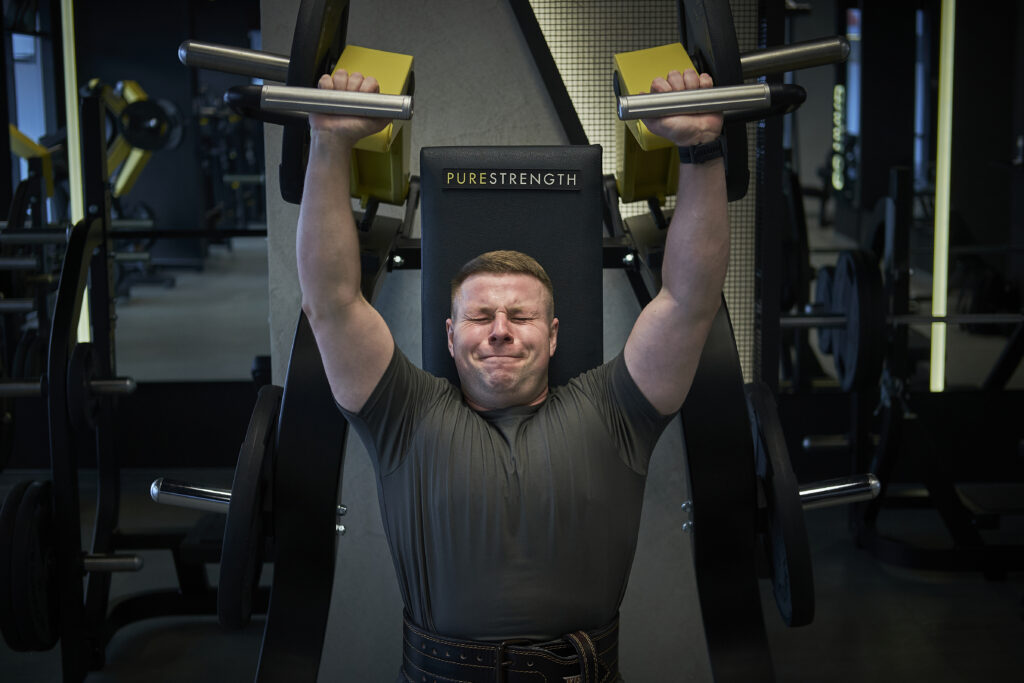
“Peacefully” Viktor served for only eight months. And already on March 1, 2014, the military unit left for Crimea.
“But we did not reach the peninsula. The task was changed on the way, and we stopped in Melitopol in the transport aviation brigade,” he says.
Rehabilitation: “You feel alive again when you pull that weight”
Next was the East. Paratroopers fought tough battles as one of the most combat-ready units of the Armed Forces. At the end of August 2014, while performing a reconnaissance mission, Viktor was injured – the spinal cord was damaged.
Sports certainly helped a lot during treatment and rehabilitation.
“At first, I started doing push-ups while standing on my knees. Then they put 20 kg on my back, then 40, then 60. When the head of the department came into my room and saw this picture, he was shocked. Later, I asked my rehabilitator, Maryana Gordynska, for some serious iron, because the small dumbbells that were in the hospital no longer suited me. The following week, a barbell was brought to the hospital. 180 kg (laughs – ed.). It was for me. What are the feelings of working with metal for the first time after the injury?… You feel that you are alive again – when you pull that weight.”
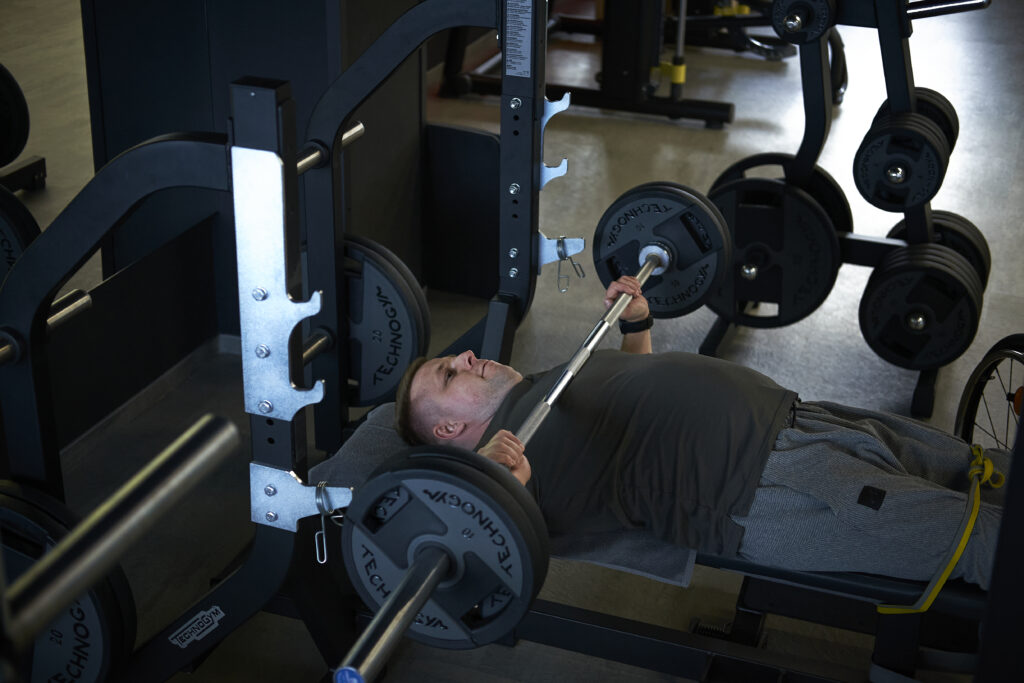
In 2019, after rehabilitation in the USA, Viktor returned to service in the Armed Forces of Ukraine.
“I planned to renew even before the rehabilitation, but then the appropriate legislative framework was not adopted. But the guys and I managed to pass a law in 2018, according to which servicemen with disabilities could stay or be renewed in the service. They were already waiting for me at the academy. Why did I return to the army? You see, a military man should be a careerist. A military man should not say: “I would serve in this position as a captain until retirement.” What the hell, then that’s all?”, the officer asks.
– That is, now you are a lieutenant colonel, and you have ambitions to get the rank of general?
– General – I don’t know, because I haven’t seen generals on carts yet. Of course, anything can happen (laughs – ed.). But the colonel – for sure.
After his return to the service, Viktor began to teach at the department of fire training at the Hetman Petro Sahaidachny National Army Academy.
At the same time, he was preparing for veteran sports competitions, and of course, he trained a lot.
His name is known not only in Ukraine, but also far beyond its borders.
So, only in 2022, the officer won seven medals (four gold, two silver and one bronze) at the Warrior Games in the USA. He became one of the best participants in the competition. Viktor also won gold and silver awards at this year’s Invictus Games in The Hague.
Now Victor trains at least three times a week for at least one and a half hours. Favorite exercise – bench press. Working weight – 100 kg, pulls 125 kg at a time. Can’t do without sports nutrition.
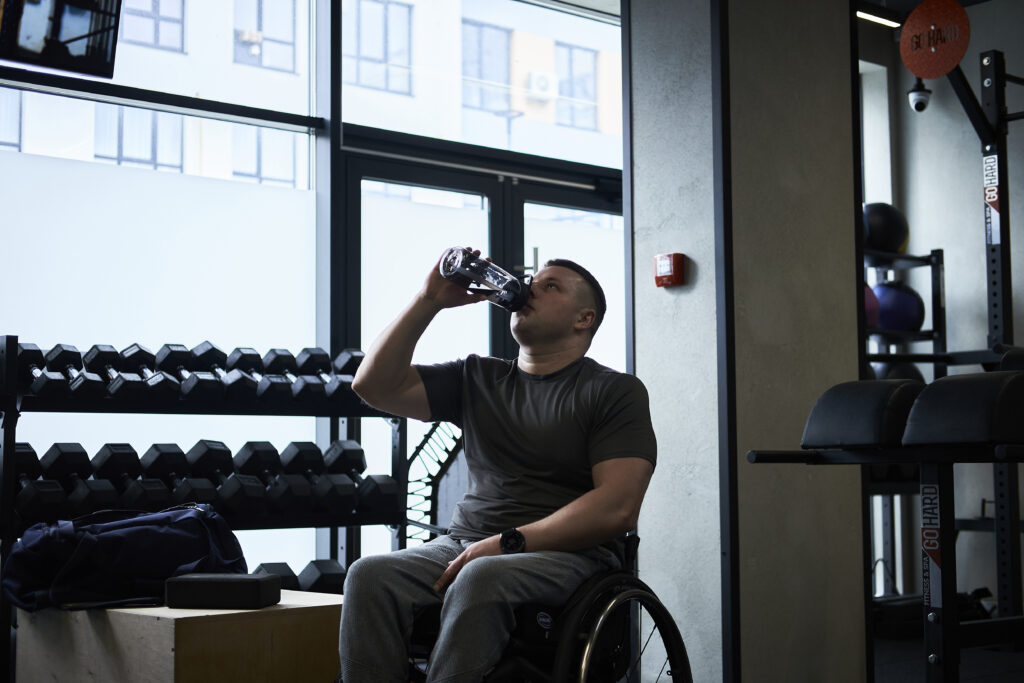
“I don’t use protein because it doesn’t work for me anymore (laughs – ed.). Amino acids are a must. They are necessary for recovery, given the loads I do. Moreover, after you have left at least 50 percent of your health there, sports supplements are really necessary.”
Now Viktor is a candidate for master of sports. By the end of the summer, he plans to become an international class master of sports.
– What does a person who wins gold under the flag of Ukraine feel?
– You simply cannot describe those emotions… You are proud to represent your country… But… You are not shocked by this. You know you put in the effort and time you put into it, and your discipline has led you to the reward. You don’t get first place without it.
– What would you advise the soldiers who are now seriously injured in the war? Their relatives? Of which, unfortunately, there are many now.
– After a full-scale invasion, I once went to the hospital – and I have never seen anything like this before. The wards are full, many soldiers with similar injuries as mine. Sometimes they ask me, do I have hope that I will still be able to walk?…
I will not leave unless something is invented in the world. And no one in the world has yet figured out how to restore the spinal cord. But for everyone with a spinal cord injury, not being able to walk is the least of their problems, honestly. In fact, there are even more health problems. I know that I will not go – already accepted as a fact and forgot about it.
Yes, a soldier may be in a mental hole for the first six months after being wounded, because he still does not understand what happened to him. The first thing is to accept your injury as a fact. The second is to focus not on what HAPPENED to you, but on how to live with it, how to live in the best way. Not just to exist, to receive a pension for the rest of your life, etc. You are a young person. You have to live actively. This must be understood.
– In your opinion, are our society and the state ready…
– No! I don’t see it! For example, I was in the States for rehabilitation. I went to the church in the diaspora. I was dressed in a Ukrainian-style military uniform. In the middle of the intersection, a dark-skinned woman stopped, opened the window of her car, and said to me: “Men, thank you for your service.” She didn’t care that I wasn’t in an American uniform. She understands that I am a soldier. They have respect for the military at the national level. It’s like wearing an embroidered shirt on Independence Day.
You drive down the road in the USA – and on the cars there are stickers: “My son is in the marines”, “My daughter is in the army.” They have it naturally and from the heart. And this despite the fact that the Americans never fought for their land – they fight for peace and democracy in the world. And they don’t know what it’s like when your house is destroyed, when your relatives are killed, etc.
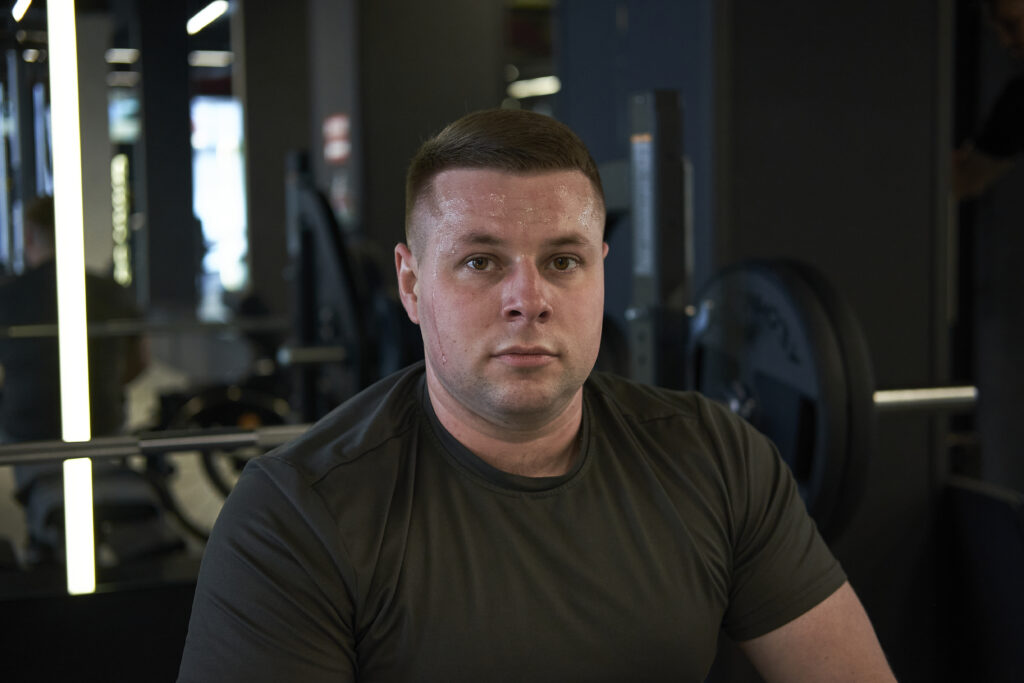
– So, actually, how to raise respect for veterans in society?
– You can’t. It is necessary to educate them physically (he laughs ironically – ed.). We have no punishments for disrespecting veterans. Someone beat the defender, sent him away, and then filmed an apology on camera – and that was it. There should be at least 15 days of imprisonment! Any fines or other administrative penalties. But we don’t have that, it’s not developed.
– Nine years of war. In your opinion, have the approaches to the work of the state and the public sector on the accessibility of infrastructure in Ukrainian cities changed? The Uklon taxi service, for example, is launching an “Inclusive” class for people in wheelchairs. How else, according to your observations, is the state preparing to become a veteran state in the center of Europe?
– Do not think that accessibility is only for veterans. How many mothers with strollers do we have? Elderly people in wheelchairs? Elementary – you broke your leg and you need a ramp. Yes, all these changes are happening, but slowly, too slowly…
– What should become a catalyst for faster changes, in your opinion?
– If they don’t understand this in 9 years, it won’t change… I can say about myself: I try to arrange my life so as not to waste my nerves. I drive a car, because the car is my legs, for example. That’s all.
– Tell us about your scientific work at the Academy, which you are currently working on.
– I am now a full-time adjunct of the scientific and organizational department. I am studying at an adjunct school, I joined last year. In civilian terms, this is graduate school. I will write my thesis for four years. The topic is very interesting – related to Russian aggression against our country.
– At one time, you taught at the fire training department of the same university. Are the cadets motivated now?
– Cadets who enter a higher military institution during the war understand perfectly well that they will end up in the war anyway. I believe this is heroism from the start.
– Does our military education need to be reformed, in your opinion?
– Changes are already coming. Many young officers become teachers. I can already see the changes.
– What will be a victory in the Russian-Ukrainian war for you?
– This should definitely not be limited to the exit to the borders of 1991. So we will go to the borders – and what next? And the Russians will not stop, and there will be new missile strikes, because we have reached our borders and pose an even greater danger to them.
The Russian Federation must admit its defeat, officially capitulate and disintegrate. Peoples living on the territory of the Russian Federation should become “people’s republics” – Buryat, Yakut, etc. Swampy Muscovy should remain, and that’s all.
H*ylo (Putin disrespectfully) should be in the dock if he will be not dead by then. Although I’m generally surprised how he hasn’t been slapped by his own environment so far.
And of course I have to get reparations. Like all the wounded. All parents and relatives of the victims should receive reparations. The family of each victim should receive at least a million dollars. At least. Injured – you can start from 500, 400, 300 thousand dollars, depending on the disability group. This is “minimum”.
The Russian Federation must be disarmed, without the right to produce weapons. Its army should not exceed 20,000 people with a certain type of weaponry (light rifle, armored). Russia must become a rogue country. Then I will feel the victory.
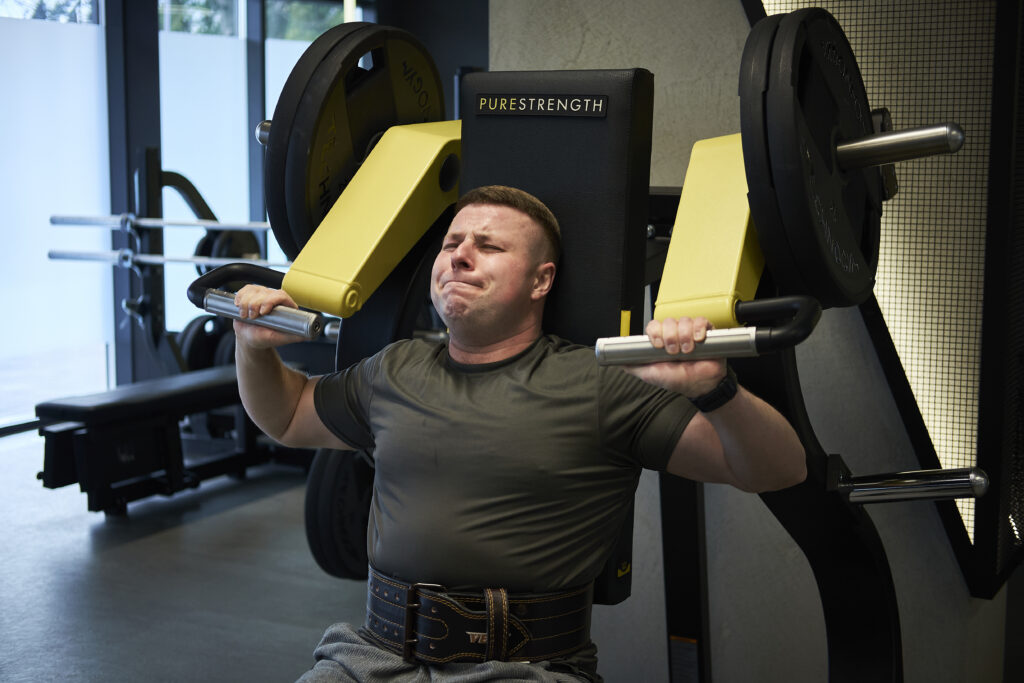
… 2023 year. Corridors of the National Academy of Land Forces named after Hetman Petro Sahaidachny. It’s noisy all around. A group of cadets is actively discussing the seminar that has just ended. Someone has a fashionable hairstyle, someone already has their first bristles, and someone has not yet gotten rid of teenage acne. But all of them are stubborn, because they are studying to become officers of the army that is at war. They all know that war awaits them.
One of the teachers of the academy is driving down the corridor in a wheelchair. Even through14:46the uniform, the relief muscular body of the man is visible, his broad shoulders. The cadets sincerely give a military salute.
Then they shake his hand, lining up one after the other. In their eyes, you can read respect for this stubborn man – he did not give up his army, teaches, does sports, participates in competitions, wins prizes, is talked about in the news, is witty and has a good sense of humor.
Cadets look at this officer and want to be like him – a stubborn careerist who does not stop developing and growing.
And they will all go to the gym in the evening. Because they have an example to follow
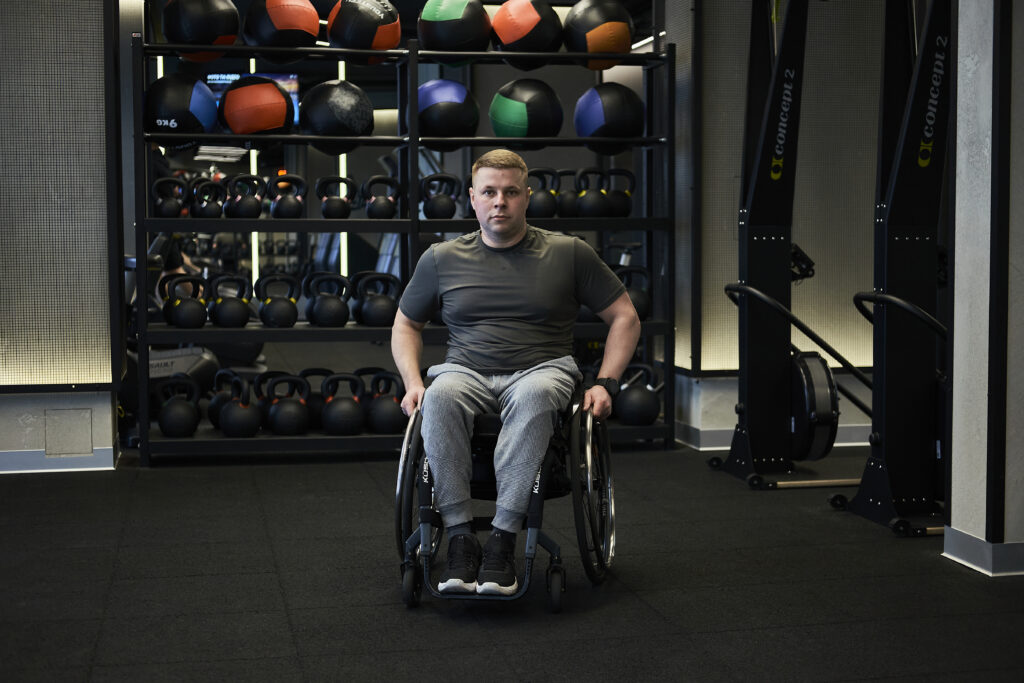
Source – Новинарня.
